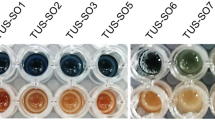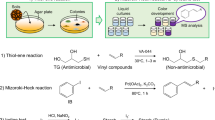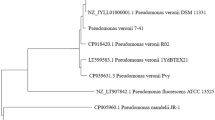Abstract
FLUOROACETATE or fluoroacetamide, after conversion to fluorocitrate, inhibit aconitase1 and therefore block the tricarboxylic acid cycle; consequently these chemicals are toxic to animals and are used as pesticides. There have been at least two occasions when accidental contamination of soil and water by fluoracetamide has occurred2. This communication reports the isolation of bacteria able to use these compounds for growth.
This is a preview of subscription content, access via your institution
Access options
Subscribe to this journal
Receive 51 print issues and online access
$199.00 per year
only $3.90 per issue
Buy this article
- Purchase on Springer Link
- Instant access to full article PDF
Prices may be subject to local taxes which are calculated during checkout
Similar content being viewed by others
References
Peters, R. A., Adv. Enzymol., 17, 113 (1957).
Hansard, 688–9 (612), 333 (1964).
Kelly, M., and Clarke, P. H., J. Gen. Microbiol., 27, 315 (1962).
Snell, F. D., and Snell, C. T., Colorimetric Methods of Analysis, 2, 750 (D. Van Nostrand Company Inc., New York, 1949).
Snell, F. D., and Snell, C. T., Colorimetric Methods of Analysis, 4, 33 (D. Van Nostrand Company Inc., New York, 1949).
Author information
Authors and Affiliations
Rights and permissions
About this article
Cite this article
KELLY, M. Isolation of Bacteria able to metabolize Fluoroacetate or Fluoroacetamide. Nature 208, 809–810 (1965). https://doi.org/10.1038/208809a0
Issue Date:
DOI: https://doi.org/10.1038/208809a0
This article is cited by
-
Biodegradation and biotransformation of organofluorine compounds
Biotechnology Letters (2010)
-
Metabolism of fluoroorganic compounds in microorganisms: impacts for the environment and the production of fine chemicals
Applied Microbiology and Biotechnology (2009)
-
Microbial degradation of synthetic organochlorine compounds
Experientia (1983)
-
Histological and size changes in corpora allata and prothoracic glands during development ofMacrotermes michaelseni (Isoptera)
Insectes Sociaux (1980)
-
Fluoroacetate toxicity inThiobacillus neapolitanus and its relevance to the problem of obligate chemoautotrophy
Archiv f�r Mikrobiologie (1968)
Comments
By submitting a comment you agree to abide by our Terms and Community Guidelines. If you find something abusive or that does not comply with our terms or guidelines please flag it as inappropriate.



